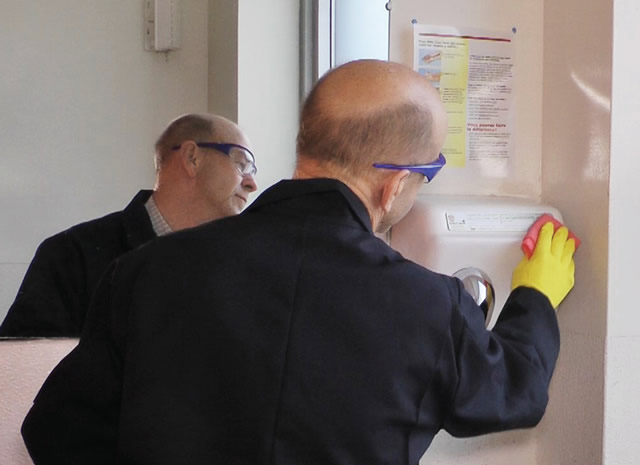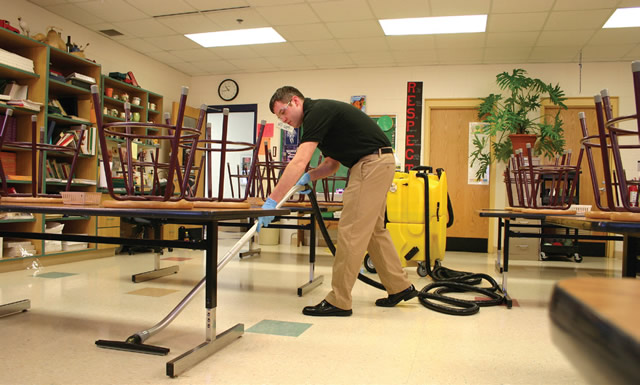COVID-19 and The Custodial Training Component
In less than a month, we find ourselves in a
different world today with changes across all sectors. Schools
and universities are closed, some for the rest of the year.
Sit-down restaurant meals have almost universally been replaced
by carryout; unemployment claims are growing; and retailers
and several other industries are joining the ranks of businesses
either required or voluntarily closing their doors for a time.
Amid these earthshaking shifts, the services of professional
cleaners are in higher demand than ever before. School and campus
administrators, building owners and managers everywhere have
now come to recognize without doubt that their facilities need effective
cleaning to help stop the spread of
the novel coronavirus.

Photo courtesy Avmor Cleaning Manufacturers
Crises can teach us many things.
Through the present pandemic, we are
learning, according to Patty Olinger,
executive director of the Global Biorisk
Advisory Council, a division of the International
Sanitary Supply Association,
“that we don’t have enough trained individuals”
in our industry, referring to the
professional cleaning industry.
Training is a crucial point to note. Safely battling the coronavirus
in all settings — schools, workplaces, government and public
buildings — requires specialized training in cleaning processes
and procedures. Training that many professional cleaners may lack,
and which contractors may fail to provide for a variety of different
reasons, as we shall discuss below. Specific skills and experience, in
addition to advanced cleaning equipment, are also required.
Issues with Training
Training challenges are not new to the
professional cleaning industry. Because of
the traditionally high turnover rate in the
industry, many building service contractors
have been reluctant to spend a lot of
time training their staff. The assumption
is that once they are trained, they’ll venture
off and find another job. This makes
training not cost effective.
But there are other issues negatively
impacting the ability of cleaning contractors as well as school and
campus administrators when it comes to training cleaning workers.
These can vary in different settings and situations. However, all of them must be overcome, and urgently,
if we are going to get on top of
the COVID-19 situation.
Among some of the most common
are the following:
- Scheduling
Most cleaning workers
work at night. Most training classes
happen during the day. Many cleaning
workers cannot attend daytime
seminars, and administrators may find
they have to pay overtime to have custodians
attend day classes. Whatever
the case, ultimately training is delayed
or postponed entirely.
- Finding Trainers
Many janitorial
distributors and manufacturers have
stepped up to the plate and are providing
excellent custodial training,
especially now, to address COVID-19. However, that is not always the case in every community. Some distributors believe
all they can do in such a critical situation is recommend cleaning “best practices,” and
suggest disinfectants approved to be used to fight COVID-19. Further, some school
districts or colleges no longer work with janitorial distributors. They purchase janitorial
and related supplies from major retailers. Often this is due to a need for cost savings. But
mega-retailers rarely provide training opportunities for custodial workers.
- Comprehension
This should not come as something new for educators, but just because
something is taught does not mean it is remembered. A study conducted in 1986, which has been updated through the years with few if any changes, finds
that 50 percent of what we “hear and see” — for instance, in a
classroom setting with other people — is forgotten in a matter
of days. In many cases, within minutes. However, 90 percent of
what we “see and do” is remembered if students practice what they
have just been taught. Remembering what we have been taught is
crucial now in preventing the spread of novel coronavirus.

Photo courtesy of Kaivac
Finding Solutions to Training Challenges
The professional cleaning industry, as we pointed out earlier, is
aware of this situation and is taking steps to make learning stick.
Some cleaning-related organizations are providing educational
materials in traditional formats as well as online, specifically addressing
COVID-19 and cleaning.
Further, at least one manufacturer has begun installing electronic
“tutors” on their cleaning machines. These tutors have
access to an entire library of cleaning methods, procedures and
best practices. Similar to a tablet computer, such tutors offer benefits
to address the learning retention issues we mentioned earlier.
Among them are the following:
- Workers learn at their own pace. Using electronic tutors also
allows workers to avoid the potential embarrassment of asking
a supervisor for help.
- They are never “absent from the classroom.” The tutor and the
cleaning equipment are the classroom.
- Systems are designed to provide best practices that can be
updated, with training demonstrated by experts.
- They provide on-demand reinforcement or retraining.
Further, when using electronic tutoring systems, what’s happening
is that custodial workers can “see and do,” which we know
is the most effective way to learn. This is how people learn today,
and it is not only proving effective, it is also proving cost effective
for both administrators and cleaning contractors.
We should note that most all forms of custodial training, whether electronic on tablets, online or in classrooms, are useful
to meet all custodial training needs, especially now. Training helps
cleaning workers feel more professional, confident, realize the value
of their work and stay on the job — reducing the turnover problem
mentioned earlier.
The Global Biorisk Advisory Council, mentioned earlier, is
establishing a new certification program that would formalize
training standards to address situations such as COVID-19.
Olinger hopes the program will become widely adopted
throughout the cleaning industry, promoting the use of best
practices to prevent the spread of disease.
However, just like a COVID-19 vaccine, that could be many
months, even years, away. As a result, school and campus administrators
must take advantage of what options they have
available now to address this crisis.
Electronic tutors appear to be one training solution. But, if
those are not available, individual instruction or group classes
in a classroom setting may be the only other option. School and
campus administrators must include custodial training as one
way to address this pandemic. Further, to help make them even
more effective, these should be ongoing sessions, repeated every
few months, until this crisis is better under control.
This article originally appeared in the March/April 2020 issue of Spaces4Learning.